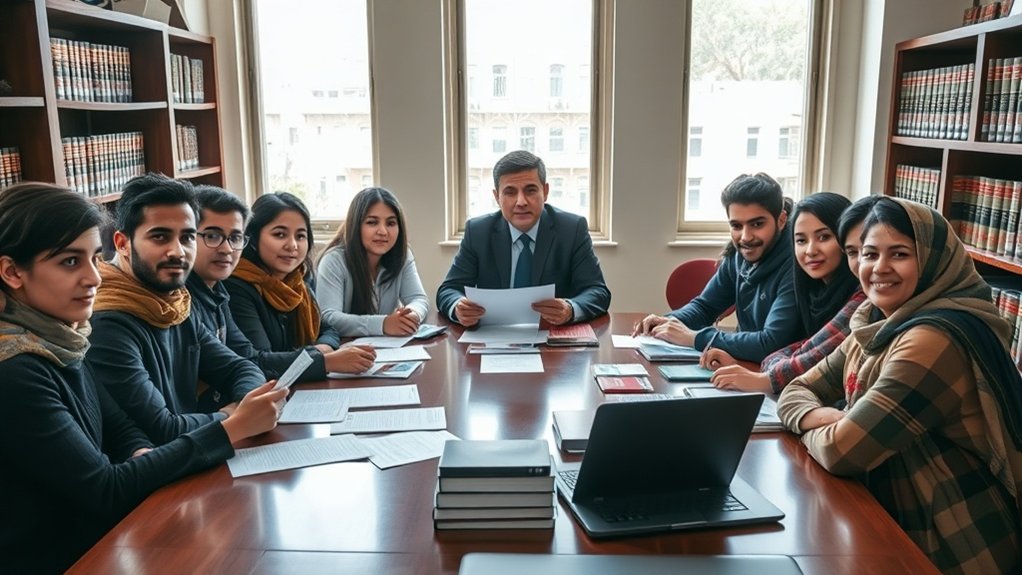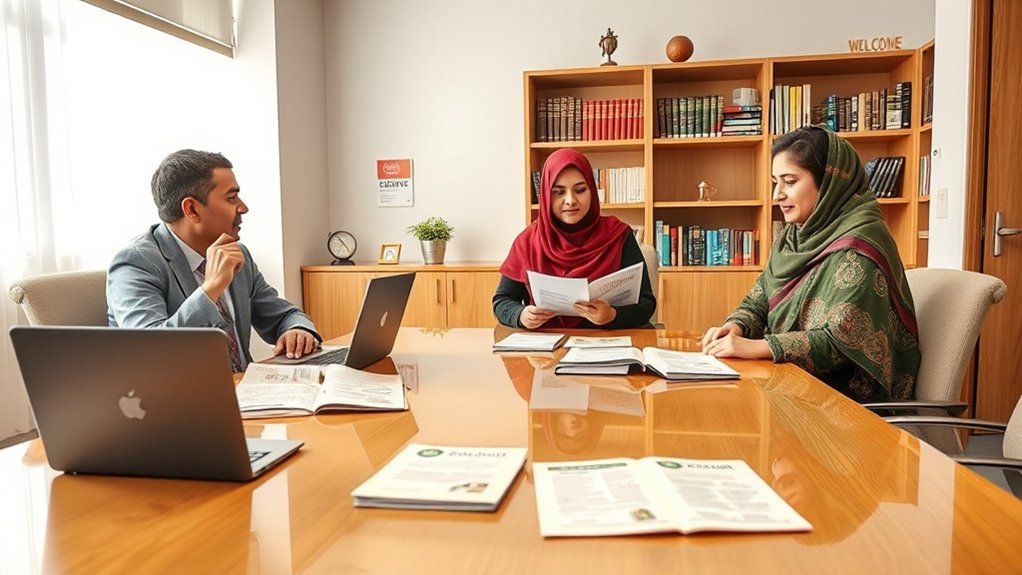If you’re an Afghan student navigating the maze of academic scholarships and legal requirements abroad, you know how complex things can get. Vieira Braga Advogados specializes in helping you understand the eligibility details, guide you through the application steps, and tackle the legal hurdles that often arise. Maintaining your student status and managing visas or document issues can feel overwhelming—especially when your future depends on each step. So, how do you ensure you stay on track and secure every opportunity?
Understanding Eligibility Requirements for Afghan Students

So, what does it take for Afghan students to qualify for academic scholarships? You’ll need to meet a set of eligibility requirements that generally focus on your academic performance, English language skills, and citizenship status. Most programs require you to show strong grades from your previous studies, usually with official transcripts as proof. You also have to prove your proficiency in English through standardized tests like TOEFL or IELTS, since courses are often taught in English.
Besides academics and language, your Afghan citizenship or official refugee status usually matters. Scholarships commonly target students from Afghanistan, so make sure your documents reflect your nationality. Some opportunities set age limits or require that you haven’t previously studied abroad. Others may need you to demonstrate financial need or leadership potential in your community. Ultimately, checking each scholarship’s specific criteria ensures you don’t waste time on programs you’re not eligible for.
For those considering remaining in the U.S. after completing their studies, it’s helpful to understand the employment-based visa categories that offer pathways to permanent residency for qualified individuals.
Once you’re confident about meeting the eligibility requirements, your next step is figuring out how to apply. Scholarships for Afghan students vary, but most have a detailed application process you’ll need to follow carefully. Start by researching the deadlines—many programs have strict dates you can’t miss. Carefully read the application instructions for each scholarship, as requirements and formats may differ.
It helps to keep these essential steps in mind:
- Prepare all required documents, such as transcripts, recommendation letters, language certificates, and identification.
- Tailor your personal statement or motivation letter to each scholarship, addressing specific questions or criteria.
- Double-check your application before submitting—errors or missing documents can result in automatic rejection.
Some applications may require you to use an online portal, while others will ask for email or postal submissions. Make a checklist and track every step to avoid last-minute stress. Planning ahead gives you the strongest chance of success. Consulting with an immigration lawyer can provide personalized guidance through all stages of the application and transition process, greatly improving your odds for success.
Legal Challenges Faced by Afghan Applicants Abroad

Although you might meet every scholarship requirement, Afghan applicants often face complex legal hurdles abroad. Host countries’ requirements go beyond academic merit, forcing you to handle visa complexities, strict travel documentation, and unpredictable embassy responses. Sometimes, political tensions and shifting immigration policies add another barrier, making your planning even more difficult.
| Legal Barrier | Impact on You | Typical Solution |
|---|---|---|
| Visa delays | Postponed program start | Early application |
| Document authentication | Application rejection risk | Certified translation |
| Changing asylum policies | Residency uncertainty | Regular policy review |
| Financial proof hurdles | Reduced chances of approval | Sponsor support |
Each country has specific rules; you must ensure your documents match every regulation. Discrepancies, even minor, could trigger lengthy reviews. You might also face difficulties proving financial stability or educational background if you’ve lacked steady access to documentation. It’s a tough process, but understanding these legal challenges increases your likelihood of success. Consulting an immigration lawyer at the earliest stage can reduce risks and help avoid common mistakes in the application process.
Steps to Secure and Maintain Student Status
To secure your student status, you’ll need to carefully complete the scholarship application process and follow all requirements. Once accepted, make sure you keep your residency permit up to date to avoid legal issues. Getting professional guidance on immigration law expertise can increase your chances of successfully managing your student status and maintaining legal compliance throughout your academic program. Let’s look at how you can handle both steps successfully.
Scholarship Application Process
Before you can benefit from Afghan academic scholarships, you need to understand and follow the application process carefully. Crafting a successful application isn’t just about submitting forms—it’s about presenting your best self and making sure every requirement is met. Start by researching scholarship opportunities early, as programs may have unique eligibility criteria and deadlines. Gather all necessary documents, such as transcripts, recommendation letters, and proof of language proficiency. Pay close attention to each step:
- Identify the most suitable scholarships based on your academic background and career goals.
- Complete and submit all required forms and supporting documents by the specified deadlines.
- Prepare for potential interviews or entrance exams, if required by the scholarship provider.
Staying organized and proactive increases your chances of securing support. If you need assistance, consulting specialized legal support can help you navigate complex documentation and avoid unnecessary delays.
Residency Permit Renewal
Once you’ve secured an Afghan academic scholarship, you need to make sure your residency permit stays current so you can legally continue your studies. Start by checking your permit’s expiration date and set reminders well in advance, as renewal processes can take weeks. Gather all necessary documents—typically your passport, proof of enrollment, updated scholarship status, and financial records. Schedule an appointment with the local immigration office or follow online renewal procedures if available. Stay alert for changes in regulations or document requirements; these can shift unexpectedly. Submit your renewal application before your current permit expires to avoid legal gaps in your student status. If you face delays, communicate proactively with your school’s international student office for support and to stay in compliance. For greater peace of mind and to navigate any complex immigration laws, consider seeking personalized guidance from an immigration lawyer who can help prevent common errors and delays.
Addressing Documentation and Visa Issues

You’ll face common challenges with gathering documents and must plan ahead for visa extensions. It’s important to learn practical strategies so you can stay on track and avoid delays. By following some key legal tips, you’ll protect your status throughout your studies. For the best results, consider seeking specialized legal assistance to help streamline your document preparation and minimize the risk of costly mistakes.
Common Document Challenges
Paperwork remains one of the toughest hurdles for Afghan students seeking academic scholarships abroad. You’ll face a range of documentation challenges that can delay or even block your academic journey. Many institutions expect timely delivery of official records, but circumstances in Afghanistan often make it hard to access or authenticate these documents. Here are some of the most common issues you might encounter:
- Missing academic records: Schools or universities in Afghanistan may be closed, destroyed, or unable to provide transcripts.
- Proof of language proficiency: Obtaining or validating TOEFL, IELTS, or other test results can be extremely difficult.
- Identification and travel documents: Passports or national IDs may be outdated, unavailable, or hard to renew.
Understanding these challenges helps you prepare ahead and avoid last-minute surprises. Having specialized legal support can make a significant difference in navigating these documentation issues and optimizing your chances for academic success.
Visa Extension Strategies
Although navigating paperwork can feel overwhelming, effective visa extension strategies will help you manage both documentation and visa issues. Start by tracking your visa expiration date and gathering all required documents, such as your current passport, enrollment verification, and financial statements. You’ll need to submit these before deadlines, so stay ahead by creating a timeline for gathering and submitting each document. Double-check your forms for accuracy to prevent delays. If you encounter missing or outdated paperwork, request replacements promptly from relevant offices or institutions. Keep copies of everything you submit for future reference. Proactive communication with your academic advisor or the scholarship office can alert you to upcoming requirements or changes. By staying organized and attentive, you’ll optimize your odds of a successful visa extension. In addition to these steps, it’s important to remember that U.S. immigration documentation must meet strict requirements, including providing proof of financial support and a valid passport, to increase the likelihood your extension will be approved.
Legal Compliance Tips
While meeting visa and documentation requirements might seem daunting, staying legally compliant ensures you won’t face unexpected obstacles during your studies. You need to pay close attention to immigration laws and always maintain accurate, up-to-date records. Don’t overlook deadlines or disregard small details—they can make a big difference. To help you stay organized and up to date, keep these tips in mind:
- Review required documents frequently to ensure they’re current before submitting any applications or renewals.
- Set reminders for all important deadlines related to visas, academic enrollments, and required updates.
- Seek guidance from your university’s international student office or trusted legal professionals if you’re unsure about any aspect of your status.
Consulting with recognized offices like Vieira Braga Lawyers can provide personalized support and help you navigate complex legal requirements effectively.
Support Services and Resources Available for Afghan Scholars

Even as you secure an academic scholarship, it’s important to know that Afghan scholars have access to a range of specialized support services and resources designed to help them thrive. Universities often offer dedicated orientation sessions, academic counseling, and language assistance tailored to international students’ unique needs. You can also rely on mentorship programs that connect you with experienced peers and faculty who understand the challenges Afghan students might face.
Most institutions provide legal advisory services, often in partnership with migration or legal aid organizations. These services guide you through documentation, visa renewals, and compliance with residency requirements. If you encounter personal or cultural challenges, don’t hesitate to reach out to counseling centers and cultural associations, which offer mental health support and foster community connections. Financial aid offices can help you access emergency funding if unforeseen difficulties arise. Remember, these resources exist to make your academic journey smoother and more fulfilling.
Frequently Asked Questions
What is the hardest scholarship to get?
Prestigious programs like the Rhodes, Fulbright, or Gates Cambridge are considered among the hardest due to strict criteria and global competition.
Which country gives 100% scholarships?
Countries like Germany, Norway, and Sweden often provide tuition-free or fully funded scholarships for international students.
What are the benefits of Allama Iqbal scholarship?
It covers tuition, living expenses, and travel for Afghan students to study in Pakistan, promoting educational and cultural exchange.
Are there scholarships for foreign students?
Yes, many nations offer scholarships to international students through government programs, universities, and NGOs.
What Are the Top Fields of Study Funded by Afghan Academic Scholarships?
You’ll find that Afghan academic scholarships often fund top fields like engineering, medicine, information technology, education, and agricultural sciences. These areas are considered vital for Afghanistan’s development and rebuilding efforts. If you’re interested in applying, focus on how your chosen field aligns with national priorities, as scholarship programs usually prioritize applicants who commit to contributing back. It’s smart to check current opportunities, since focus areas may shift with changing national needs.
Are Scholarships Available for Online or Distance Learning Programs?
Yes, you can find scholarships for online or distance learning programs, though availability varies by provider. Many organizations recognize the value of remote education and want to support students who can’t attend in-person classes. You should carefully review scholarship criteria, as some focus strictly on traditional formats, while others embrace e-learning. Make sure you highlight your goals and explain why online study suits your situation when applying for these opportunities.
How Do Afghan Graduates Connect With Alumni Networks Abroad?
You can connect with alumni networks abroad by joining official alumni associations, attending virtual networking events, and participating in online forums or social media groups. Many universities have dedicated platforms or LinkedIn groups just for alumni. Don’t hesitate to reach out directly to alumni through these channels, as most are happy to offer support or advice. Building relationships this way helps you stay informed and opens professional opportunities worldwide.
Can Family Members Accompany Scholarship Recipients During Their Studies?
Yes, your family members can often accompany you while you study abroad on a scholarship, but you’ll need to check the specific visa requirements for your host country. Most countries allow you to bring immediate family, like your spouse or children, but you must apply for their dependent visas separately. Make sure you’ve planned financially and logistically, since you’ll be responsible for supporting your dependents during your stay.
What Are the Employment Prospects After Completing Scholarship-Funded Studies?
After completing scholarship-funded studies, you’ll often find more doors open for employment, especially if you’ve gained skills in high-demand fields. Some countries allow you to apply for post-study work visas, letting you seek jobs and gain experience. If you network and build relevant expertise during your studies, you’ll boost your chances further. Remember to check specific immigration and labor regulations, since opportunities can vary greatly depending on your host country’s policies.
Conclusion
As you pursue academic opportunities abroad, understanding scholarship eligibility and staying compliant with student status requirements is crucial. Don’t let legal hurdles, documentation issues, or visa delays overwhelm you. Vieira Braga Advogados is here to guide you every step of the way—offering legal advice, help with paperwork, and mental health support. With the right information and support, you can confidently navigate challenges and focus on your academic goals. You’re not alone on this journey.



